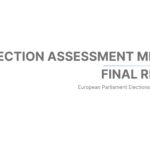
Upcoming EU Regulation of political advertising and its impact discussed in Romania
Bucharest, 28 September 2023: Election-Watch.EU was invited by the Expert Forum (Romania) to contribute to a report and High-Level Panel on regulating political advertising at the European Commission Representation in Bucharest. Representatives from the Romanian election management body, regulating authorities, political parties, as well as Google and civil society presented their views on the upcoming EU Regulation. The discussion focused whether the Romanian institutional landscape is prepared to implement the Regulation in time ahead of the super-election year 2024 in Romania.
Ahead of the 6-9 June European Parliament (EP) elections relevant and crucial new European legislation like the Digital Services Act (DSA) and the Digital Market Act (DMA) have been passed. Some legislation is still expected to be passed in due course like the AI Act, the European Media Freedom Act and the Regulation on the Targeting and Transparency of Political Advertising (TTPA).
Most importantly for elections the DSA came into force on 16 November 2022 and will be directly applicable across the EU by 17 February 2024. The DSA applies to all providers that offer services in the EU regardless of their place of registration. The DSA singles out Very Large Online Platforms (VLOPs) as well as Very Large Online Search Engines (VLOSEs), which are platforms with more than 45 million average monthly active users in the EU. In total 17 very large platforms and very large online search engines (among them Facebook, Instagram, Google, YouTube, X (formerly Twitter), Snapchat, LinkedIn, Tik Tok, Apple, Amazon, Booking and Alibaba), have to comply with their obligations under the DSA since 25 April 2023. The DSA results in enhanced transparency rules, including for online platforms to disclose the number of removal orders issued by national authorities as well as all notices about the presence of illegal content highlighted by trusted flaggers. The DSA will be enforced through EU Member State Authorities and the European Commission (EC), where national authorities must assign a competent authority to supervise and enforce. For VLOPs and VLOSEs, the EC will be the enforcement body.
The efficacy of any effort beyond the DSA to regulate political advertising within the digital sphere hinges upon the establishment of a robust and effective mechanism for recognising political advertisements. The envisaged European Union (EU) Regulation on the Targeting and Transparency of Political Advertising (TTPA) is currently at the trilog stage and further negotiated between the current Spanish Presidency of the Council of the EU on behalf of the Council, the European Parliament (EP) and the European Commission (EC). The TTPA was drafted with the aim to enhance transparency of political advertising and of Artificial Intelligence (AI)-powered online campaigning (see Election-Watch.EU Policy Paper), and to counter disinformation, as online news platforms are becoming increasingly important as the first source of news among EU citizens.

Opening Speech of Mr. Sorin Ioniță, President of the Expert Forum
2024 EP elections, EP elections 2024, inclusion in elections, political advertising regulation, transparency of political campaign, TTPA
 Election Assessment Mission Report with good practice examples published
Election Assessment Mission Report with good practice examples published
 Presenting Electoral Reform Paper at the Electoral Integrity Project Conference
Presenting Electoral Reform Paper at the Electoral Integrity Project Conference
 Social media monitoring of Austria’s general election campaign
Social media monitoring of Austria’s general election campaign
 How best to assess hybrid threats in elections?
How best to assess hybrid threats in elections?
 Telegram and its role in Austria’s 2024 election
Telegram and its role in Austria’s 2024 election